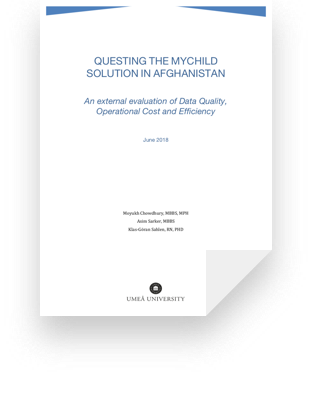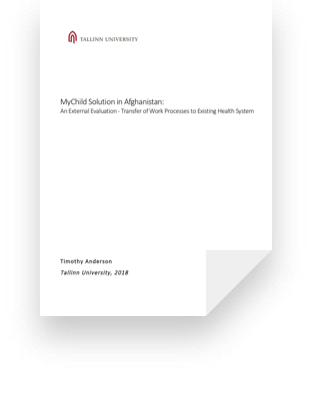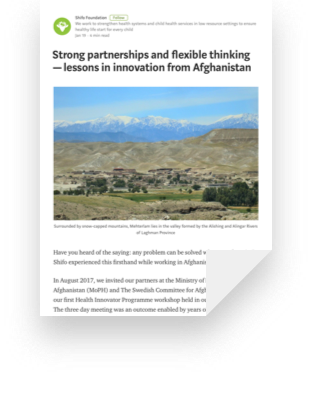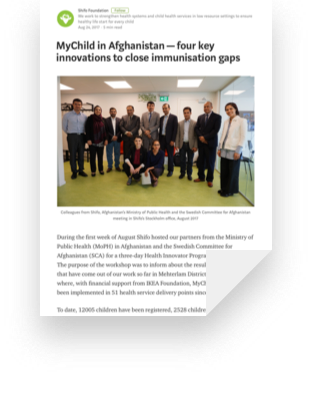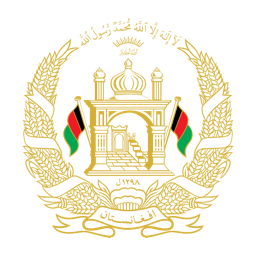Currently, 828 health service delivery points* in Laghman and Wardak Provinces are using Smart Paper Technology Solution
* fixed, outreach and mobile clinic sites
In 2015 Ministry of Public Health of Afghanistan, (MoPH), Swedish Committee for Afghanistan (SCA) and Shifo Foundation (Shifo) joined hands to improve immunisation information system, which would improve data quality and data use. Assessments showed that point-of-care eHealth solutions are not timely in Afghanistan and cannot replace existing systems based on paper forms, because of lack of infrastructure in most health service delivery points (HSDP), the security risk to health workers and high-operating costs, which are not sustainable for MoPH.
Because people live in mountainous areas, almost 90% of health service deliveries are conducted through outreach visits and mobile clinics, which brings further complexity for fully shifting to point-of-care eHealth solutions.
In 2016, partners have agreed to test and evaluate Smart Paper Technology, a hybrid paper-to-digital solution, to bring the same benefits as fully digital health solutions, and which bypasses infrastructure challenges and has low operating costs.
In 2017, Smart Paper Technology was first implemented and evaluated in Mehterlam District to support immunisation services for children and women of childbearing age. The project was financially supported by IKEA Foundation.
Based on an external evaluation in Mehterlam District in 2018, MoPH decided to shift/retire existing system and use exclusively Smart Paper Technology in all the health facilities in Laghman Province. This was an important decision for bringing systems change and institutionalising Smart Paper Technology Solution in Afghanistan.
Since then Smart Paper Technology Solution was adopted at scale in all 648 health service delivery points in Laghman Province, which includes 51 fixed, 376 outreach and 256 mobile clinic sites.
Thanks to support from SCA and Swedish International Development Agency (Sida), Smart Paper Technology is currently being scaled-up in Wardak Province, where already 145 health service delivery points are using SPT to register and follow-up on children and women receiving preventive health services.
The following data use interventions have been integrated across the health care chain:
At the community level, families with children and women of childbearing age receive SMS messages one day before their visit reminding them about their due date to visit the facility.
Health workers receive their key performance indicators and develop strategies to improve coverage, equity and quality of immunisation services in the underperforming areas.
All mandatory HMIS and LMIS reports are automatically generated by the system and made available to key stakeholders on a timely basis.
Automatically generated request forms are used by provincial medical stores to deliver vaccines and other supplies to each health facility.
Decision-makers and planners at provincial level review the performance of each health facility using the integrated dashboard and follow up with the facilities, which have low-performance indicators.
External evaluation results
The data quality assessment, based on WHO's data quality review toolkit, indicated high-quality data generated from the solution for all the metrics, namely: completeness (100%), timeliness (91,66%) and internal/external consistency (100%). Moreover, the ratio of the data recording error was low in the study, ranging from 0.05% to 1.7%.
A time efficiency evaluation, assessing how much time health workers spend on administrative tasks during and after delivery of care with Smart Paper Technology compared to the existing collecting and reporting tools, showed that around 64% to 96% of the time could be reduced in different stages of data administration.
A cost analysis comparing operational costs of the Smart Paper Technology (SPT) Solution and the existing data collection and reporting forms concluded that, when factoring the value of reduced administration, the SPT Solution cost 316,436 USD (0.228 USD per child) which is less expensive than the cost of printing the existing HMIS forms which cost 873,253 USD (0.630 USD per child). When the administration time was excluded from the analysis, the SPT Solution (206,126 USD) was more expensive than HMIS forms (195,581 USD). However, it is noteworthy that the SPT Solution was only 5% more expensive than the current HMIS when excluding administration costs.
The results of the evaluation regarding the transfer of work processes to the existing health system, which is one of the key success metrics to evaluate the sustainability of the programme and how well it can be managed by the local stakeholders in Afghanistan, indicated that 95% of the processes essential to the management of Smart Paper Technology had been transferred to the local stakeholders in Laghman Province. In most cases, these processes have been transferred in a way that is both accurate and sustainable. The remaining processes are planned to be fully transferred at the national level.
